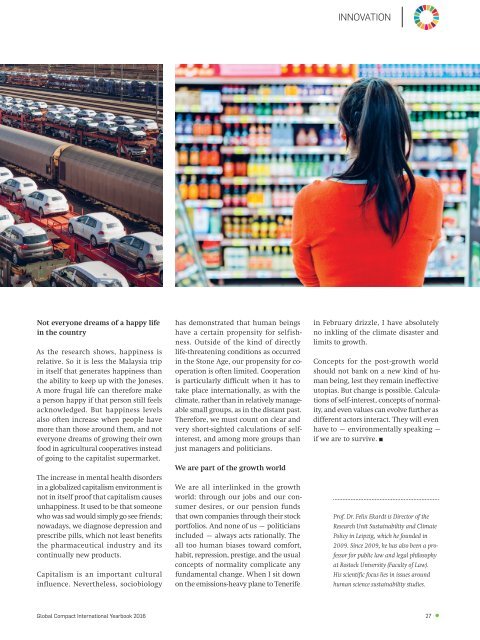Global Compact International Yearbook 2016
The Sustainable Development Goals are an ambitious agenda with 17 topics addressing the global challenges of our time. A key topic is innovation: Business must fit into planetary boundaries. This probably will not work with traditional business models. That is why we need new, fresh ideas. We need change, even when it happens in a rough, disruptive way. And the earlier the better. This is why the upcoming edition of the Global Compact International Yearbook, published in September 2016, has chosen sustainable innovation as the key topic. Also includes exclusive interviews with Angelina Jolie, Robert Redford and Sigourney Weaver. The Global Compact International Yearbook is with more than 500,000 readers one of the worlds leading CSR publications. Münster/New York 2016: 164 pages, paperback Publishing houses: macondo publishing/UN Publications Subscription (via UN Publications only): 30.00 USD (regular) 15.00 USD (reduced) ISBN13: 978-3-946284-01-7 / ISSN-Print: 2365-3396 / ISSN-Internet: 2365-340x
The Sustainable Development Goals are an ambitious agenda with 17 topics addressing the global challenges of our time. A key topic is innovation: Business must fit into planetary boundaries. This probably will not work with traditional business models. That is why we need new, fresh ideas. We need change, even when it happens in a rough, disruptive way. And the earlier the better. This is why the upcoming edition of the Global Compact International Yearbook, published in September 2016, has chosen sustainable innovation as the key topic.
Also includes exclusive interviews with Angelina Jolie, Robert Redford and Sigourney Weaver.
The Global Compact International Yearbook is with more than 500,000 readers one of the worlds leading CSR publications.
Münster/New York 2016: 164 pages, paperback
Publishing houses: macondo publishing/UN Publications
Subscription (via UN Publications only): 30.00 USD (regular) 15.00 USD (reduced)
ISBN13: 978-3-946284-01-7 / ISSN-Print: 2365-3396 / ISSN-Internet: 2365-340x
Create successful ePaper yourself
Turn your PDF publications into a flip-book with our unique Google optimized e-Paper software.
innoVAtion<br />
Not everyone dreams of a happy life<br />
in the country<br />
As the research shows, happiness is<br />
relative. So it is less the Malaysia trip<br />
in itself that generates happiness than<br />
the ability to keep up with the Joneses.<br />
A more frugal life can therefore make<br />
a person happy if that person still feels<br />
acknowledged. But happiness levels<br />
also often increase when people have<br />
more than those around them, and not<br />
everyone dreams of growing their own<br />
food in agricultural cooperatives instead<br />
of going to the capitalist supermarket.<br />
The increase in mental health disorders<br />
in a globalized capitalism environment is<br />
not in itself proof that capitalism causes<br />
unhappiness. It used to be that someone<br />
who was sad would simply go see friends;<br />
nowadays, we diagnose depression and<br />
prescribe pills, which not least benefits<br />
the pharmaceutical industry and its<br />
continually new products.<br />
Capitalism is an important cultural<br />
influence. Nevertheless, sociobiology<br />
has demonstrated that human beings<br />
have a certain propensity for selfishness.<br />
Outside of the kind of directly<br />
life-threatening conditions as occurred<br />
in the Stone Age, our propensity for cooperation<br />
is often limited. Cooperation<br />
is particularly difficult when it has to<br />
take place internationally, as with the<br />
climate, rather than in relatively manageable<br />
small groups, as in the distant past.<br />
Therefore, we must count on clear and<br />
very short-sighted calculations of selfinterest,<br />
and among more groups than<br />
just managers and politicians.<br />
We are part of the growth world<br />
We are all interlinked in the growth<br />
world: through our jobs and our consumer<br />
desires, or our pension funds<br />
that own companies through their stock<br />
portfolios. And none of us – politicians<br />
included – always acts rationally. The<br />
all too human biases toward comfort,<br />
habit, repression, prestige, and the usual<br />
concepts of normality complicate any<br />
fundamental change. When I sit down<br />
on the emissions-heavy plane to Tenerife<br />
in February drizzle, I have absolutely<br />
no inkling of the climate disaster and<br />
limits to growth.<br />
Concepts for the post-growth world<br />
should not bank on a new kind of human<br />
being, lest they remain ineffective<br />
utopias. But change is possible. Calculations<br />
of self-interest, concepts of normality,<br />
and even values can evolve further as<br />
different actors interact. They will even<br />
have to – environmentally speaking –<br />
if we are to survive.<br />
Prof. Dr. Felix Ekardt is Director of the<br />
Research Unit Sustainability and Climate<br />
Policy in Leipzig, which he founded in<br />
2009. Since 2009, he has also been a professor<br />
for public law and legal philosophy<br />
at Rostock University (Faculty of Law).<br />
His scientific focus lies in issues around<br />
human science sustainability studies.<br />
<strong>Global</strong> <strong>Compact</strong> <strong>International</strong> <strong>Yearbook</strong> <strong>2016</strong> 27

















